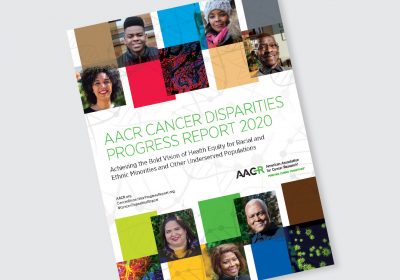
AACR Meeting Highlights Progress Against Cancer Health Disparities
Researchers present findings on causes and effects of inequities based on race, ethnicity, and other factors.
The 16th AACR Conference on the Science of Cancer Health Disparities in Racial/Ethnic Minorities and the Medically Underserved, held September 29 to October 2, 2023, in Orlando, Florida, was pivotal in the efforts of the American Association for Cancer Research® to end cancer health disparities.
This year’s conference opened with a spotlight on three individuals working to lessen disparities in cancer care. Danielle Carnival, PhD, deputy assistant to President Biden for the Cancer Moonshot and deputy director for health outcomes of the White House Office of Science and Technology Policy, updated attendees on the Cancer Moonshot and discussed the importance of building trust in marginalized communities. Patient advocate Aki Smith spoke of her father’s struggles in navigating the health care system during treatment for stomach cancer and her current efforts to help other patients do the same. Finally, Folakemi Odedina, PhD, was recognized for her decades of work addressing disparities in prostate cancer and recruiting diverse patient populations into clinical trials.
Scientific Program Sheds Light on Advances and Ongoing Challenges
The broad scientific program highlighted the varied approaches researchers have taken to identify, understand, and address disparities in cancer health.
Plenary sessions explored cancer care among Indigenous populations, progress on the Cancer Moonshot, structural racism’s impact on disparities, efforts to increase diversity in clinical trials, disparities associated with persistent poverty and living in rural communities, and the use of big data and artificial intelligence to reduce disparities. A special session explored the impact of anti-DEI laws on cancer disparities. (DEI stands for diversity, equity, and inclusion.)
Other presentations touched on similar themes. Select studies presented at the conference are described below.
Understanding the Lack of Diverse Representation in Clinical Trials
One study illustrated that, while most surveyed patients in the Philadelphia area were open to participating in clinical trials, those from racial and ethnic minorities were significantly less likely to do so. Reasons for not participating in clinical trials included fear of side effects, concerns about the experimental drug’s efficacy, lack of awareness of trial locations, mistrust in physicians or the pharmaceutical industry, and concerns about the amount of time required. The study could inform clinical trial recruitment strategies, researchers noted.

Despite ongoing challenges, findings from another study offered hope. The analysis of more than 20 years of clinical trial data found that NCI-sponsored cancer clinical trials have become more diverse in recent years, with greater representation of older patients, racial and ethnic minorities, and patients from historically underrepresented regions of the U.S. Researchers speculated that the greater number of available early-phase clinical trials, changes to eligibility criteria, and an increase in the number of small sites offering clinical trials may have contributed to the increased diversity of clinical trial participants in recent years.
Identifying Disparities and Underlying Factors in Underserved Communities
Researchers continue to uncover factors that contribute to cancer health disparities. One study suggested that lack of awareness of cancer risk factors could be one issue. Researchers found that a large portion of surveyed Spanish-speaking men in the LGBTQ+ community were unaware that infection with the human papillomavirus (HPV) could cause cancer or that men could be infected with HPV. They were also less likely to be offered HPV vaccination, which could put them at increased risk of HPV-related cancers.
Another study found that certain racial and ethnic minority patients undergoing breast cancer treatment were less likely to receive palliative care, which is intended to relieve discomfort associated with cancer or cancer therapy and is associated with improved quality of life and longer survival.
Structural racism may also contribute to increased cancer mortality among racial minorities, according to another study. Researchers found that factors such as residential segregation, incarceration, unemployment, low economic status, and lack of education were associated with increased county-level cancer mortality rates among minority populations compared with whites.





